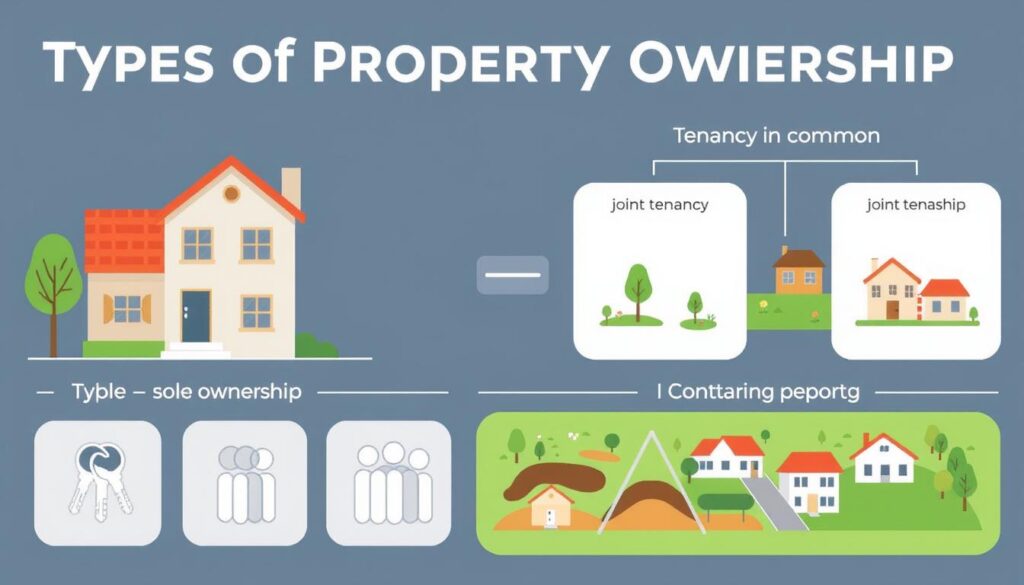
Buying a home is a big deal, both financially and legally. The world of real estate can be very complex. This guide offers key legal tips for home buyers. It covers important topics like property law, contracts, and due diligence.
It’s designed to help buyers understand the legal side of buying a home. This way, they can make smart choices.
An elegant, modern real estate office, with a large wooden desk covered in property law documents, a gavel resting on top, and a glowing scale of justice in the background, surrounded by framed property titles and architectural blueprints, warm lighting creating a sophisticated atmosphere.
Key Takeaways
- Learn about property law and types of ownership to make informed decisions.
- Get to know common legal terms in real estate.
- Do a thorough check, including title searches and looking at liens and encumbrances.
- Make sure you follow zoning laws and building codes to protect your investment.
- Get advice from a real estate attorney to handle the legal parts of buying a home.
Understanding Property Law Fundamentals for Home Purchase
Buying a new home means you need to know about property law basics. This part covers property types, legal terms, and state laws. It’s all about making sure you understand the process.
Types of Property Ownership and Titles
There are main types of property ownership: fee simple, joint tenancy, and tenancy in common. Fee simple gives the owner full rights. Joint tenancy and tenancy in common mean shared ownership, each with its own rules. Knowing these is key for anyone buying a home.
Common Legal Terms in Real Estate Transactions
Real estate deals use many legal terms you might not know. Words like “deed,” “mortgage,” “lien,” and “escrow” are important. Learning these terms helps you understand the process better.
State-Specific Property Laws
Every state has its own property laws that affect buying a home. These laws cover things like transfer taxes and how to record a deed. Knowing these laws is important for a smooth home purchase.
| Property Ownership Type | Description | Key Considerations |
|---|---|---|
| Fee Simple | The highest form of property ownership, granting the owner full rights to the land and any improvements. | Provides the most comprehensive control and rights over the property. |
| Joint Tenancy | Shared ownership of the property, with each owner having an equal, undivided interest. | Allows for the automatic transfer of ownership to the surviving joint tenant(s) upon the death of one owner. |
| Tenancy in Common | Shared ownership of the property, with each owner holding a distinct, fractional interest. | Does not automatically transfer ownership to the surviving owner(s) upon the death of one owner. |

A detailed infographic illustrating different types of property ownership, featuring a house, apartment building, and land parcels, divided into sections labeled as “Sole Ownership,” “Joint Tenancy,” “Tenancy in Common,” and “Community Property.” Use visual symbols to represent each type, such as keys, handshake icons, or family silhouettes, with a clean, modern design and a harmonious color palette.
“Understanding the fundamental aspects of property law is essential for any prospective homebuyer to make informed decisions and navigate the real estate purchase process successfully.”
Legal Tips Real Estate: Key Documents and Contracts
Buying a home is a big deal. It’s important to know the legal stuff. Key documents and contracts are crucial in real estate deals. They help protect your interests as a buyer.
The purchase agreement is the base of the deal. It lists the sale’s terms, like price and closing date. It’s key to review it well to know your rights and duties.
The property deed is another must-have. It transfers the property’s ownership from seller to buyer. Make sure to check the deed for clear title and no hidden issues.
Seller disclosures are also vital. They tell you about the property’s state, including any problems. Reviewing these helps you make a smart choice and spot any issues to talk about.
Lastly, getting a contract review is a smart move. A real estate lawyer can check all documents. This ensures your rights are protected and you understand the deal fully.
“Investing in real estate is not just about finding the perfect property; it’s about navigating the legal landscape with confidence and care.”
Knowing about these documents and contracts helps you make a better choice. It makes the real estate process smoother. Remember, taking time to understand these legal parts can prevent future problems.
Due Diligence: Protecting Your Investment
Buying a new home is exciting, but you must do your homework. This part talks about the key steps to find legal problems and avoid surprises.
Title Search and Insurance Requirements
First, do a detailed title search. It checks who owns the property and if there are any liens. Also, get title insurance to protect against future title problems.
Property Liens and Encumbrances
It’s vital to find out about any liens or encumbrances. Liens can be for unpaid taxes or mortgages. Knowing this can save you from financial and legal troubles.
Zoning Laws and Building Codes
Learn about local zoning and building codes. Zoning laws tell you how you can use the land. Building codes ensure the property is safe and meets standards. This helps avoid costly fixes or use issues.
| Due Diligence Checklist | Importance |
|---|---|
| Title Search | Verifies ownership history and identifies any liens or encumbrances |
| Title Insurance | Provides an additional layer of protection against unforeseen title issues |
| Lien and Encumbrance Research | Uncovers any financial obligations or legal complications that could impact the sale |
| Zoning and Building Code Review | Ensures the property can be used as intended and avoids costly surprises |
By carefully checking these due diligence points, buyers can make smart choices and protect their investment.
Working with Real Estate Attorneys: When and Why
Real estate transactions can be very complex. That’s why a good real estate attorney is so important. They offer legal advice and protect your interests during the home buying process.
Attorneys are key in complex deals. This includes commercial properties, homes with multiple owners, or deals with special legal needs. They know the laws in your state well. This helps you avoid problems and follow all rules.
It’s wise to talk to a real estate attorney if you face legal issues. They can help solve disputes, negotiate contracts, and protect your rights. They also make sure you understand all the important documents in real estate.
FAQ
What are the different types of property ownership and titles?
There are several types of property ownership and titles. These include fee simple, joint tenancy, tenancy in common, and condominium or cooperative ownership. Knowing the differences is key when buying a home.
What are some common legal terms used in real estate transactions?
Real estate deals use terms like deed, title, mortgage, lien, and easement. Understanding these terms helps you move through the buying process more smoothly.
How do state-specific property laws impact the home buying process?
Property laws vary by state. They affect things like title transfers and disclosure rules. It’s vital to know the laws in the state where you’re buying.
What are the key legal documents involved in a real estate transaction?
Important documents include the purchase agreement and property deed. Also, mortgage or loan documents, title insurance, and disclosure forms are crucial. Reviewing these documents protects your interests.
Why is a title search and title insurance important?
A title search and insurance ensure the property is free from liens and ownership issues. This safeguards your investment and rights as a homeowner.
How can property liens and encumbrances affect a real estate transaction?
Liens and encumbrances can complicate or even stop a sale. They include unpaid taxes or mortgages, and easements or restrictions. Identifying and resolving these issues is crucial.
What role do zoning laws and building codes play in the home buying process?
Zoning laws and building codes determine what can be built on a property. Knowing these laws ensures the property fits your plans and any future renovations.
When is it advisable to consult a real estate attorney?
You should consult a real estate attorney for complex deals. This includes investment properties, commercial real estate, or properties with unique legal issues. An attorney can guide you and protect your interests.










